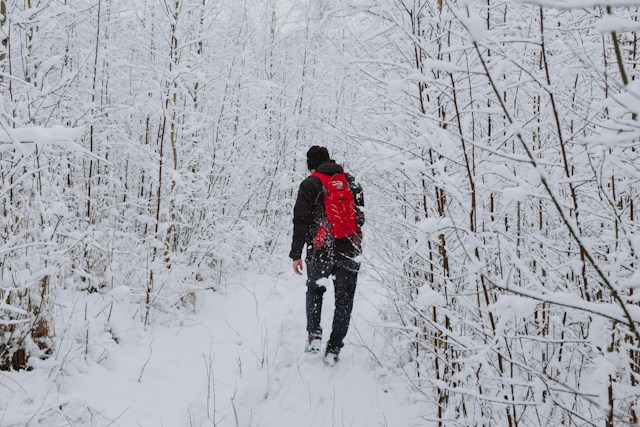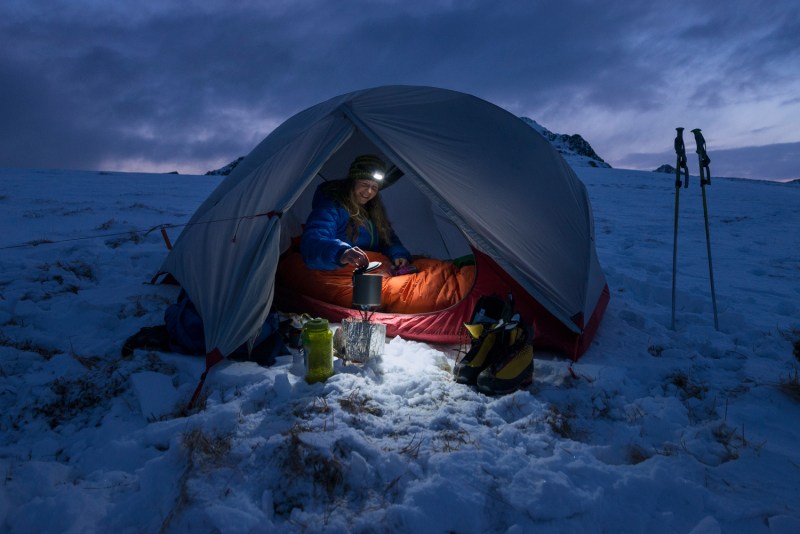One of the main concerns of camping in the snow is hypothermia. Yes, you will probably experience some cold days and nights, but there are ways to stave off the cold, especially if you have the right gear. When done right, camping in the snow can be an invigorating adventure that gives you quicker access to all of your favorite winter sports. Here’s how to fend off one of winter campers’ biggest threats.
What is hypothermia?

Regular body temperature is considered to be about 98.6 degrees Fahrenheit, and hypothermia is when your body temperature drops below 95 degrees. According to the Mayo Clinic, this is when the body loses heat faster than it can produce it, which is terrible for your heart, nervous system, and organs. This is considered a dangerous medical emergency, so it’s best to play it safe when planning to camp outside.
Because hypothermia essentially slows down all of your bodily functions, it makes sense that the symptoms of hypothermia include shivering, slurred speech or mumbling, shallow or slow breathing, a weak pulse, clumsiness or lack of coordination, drowsiness, confusion, or in the worse cases, loss of consciousness. Symptoms can appear gradually, so it’s important to have many backup plans while camping in the snow.
If you or a camping buddy starts to experience these symptoms, it’s important to call a medical professional and warm up by gently moving inside if possible and carefully replacing any wet clothing with warm, dry coats of blankets. Do your best to keep warm until medical help arrives, but if you suspect that you also have frostbite, don’t use a heater to warm up because using too much heat too quickly could do more damage.
How to prevent hypothermia when camping in the snow

Have a backup plan
First, I cannot stress enough the importance of a backup plan. If you’re winter camping, make sure you have a plan in place if things go south. Research the area and see what hotels are nearby and whether they have availability. Know where the closest hospital is, and check out the restaurants nearby for warm foods. You may not have service if you’re going to some place super remote, so doing this before you leave will make any emergency situation less stressful.
Bring spare clothes and emergency supplies
Second, you can’t use spare clothes and emergency blankets if you don’t pack any. Pack more than you think you’ll need in case any of your gear gets wet. Prioritize socks and base layers. Water or moisture will be your biggest enemy, so at the very least, stash the extras in your car. Don’t skimp on your layering system or camping gear, either. Winter camping heaters are also great to bring, but be careful while using them to avoid carbon monoxide poisoning.
Be smart with tent placement
When you get to your camping location, I can’t stress the importance of being smart with your tent setup. Choose a spot that’s on higher, preferably dry ground, where the morning sunlight can reach you. This avoids valleys where cold air often settles. Also, look for trees or rocks or build a snow wall around your tent to block out the wind. Wind shear can make the air feel several degrees colder than it actually is, and it can worsen hypothermia risks.
Eat high-calorie and high-nutrient meals
Next, eat some good, balanced meals. In order to generate heat, your body will need all of the extra energy that you can give it, so pack all of your favorite nutrient-dense, high-calorie meals and snacks. My favorites include oatmeal with nuts and dried fruit, chili and rice, breakfast burritos (which you can make at home and heat over a fire or camping stove), and all kinds of soup.
Sip warm drinks constantly
Speaking of camping stoves, these will be your best friend. One of the best ways to stay warm (and hydrated) is to keep drinking warm liquids. Whether that’s hot chocolate, herbal tea, or broth, your body will thank you. If you absolutely cannot go without your morning cup of joe, fine, grind those coffee beans. However, caffeine isn’t the best while you’re out in the winter wonderland because it can lead to mild dehydration. As long as it’s not the only thing you’re chugging, by all means, have your morning coffee.
Don’t underestimate the value of a companion
Nights are often the worst part of camping in the snow, but don’t underestimate the value of a companion. Whether it’s your significant other,
Above all, be safe. There’s no shame in bailing on an adventure if it starts to get miserable. There will always be other opportunities to get out there, and it may take some time and practice to figure things out for your climate. If you’re a beginner at camping in the snow, I recommend starting small.




